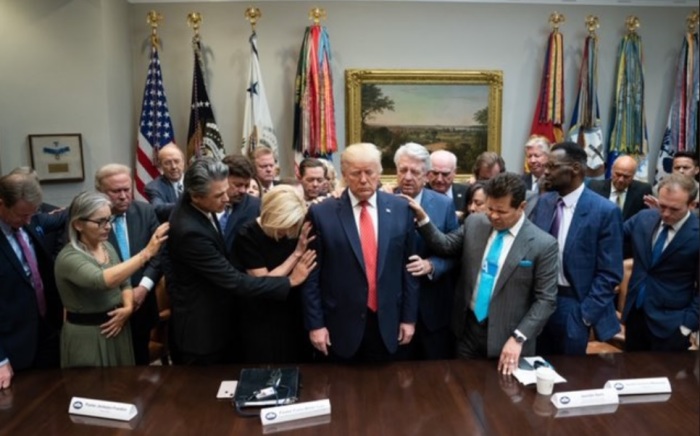'Threat to democracy' or media phantom? Christian nationalism debate takes violent turn
Evangelicals wrestle with language, political agendas, potential 'fusion of Christianity and the state'

Christian nationalism in the age of Trump
And then there's Trump.
For most of the mainstream media, Trump's rise to political power paved the way for the emergence of Christian nationalism, with some issuing dire warnings about a second Trump administration.
One of those alleged efforts is part of something called Project 2025, a collection of conservative and right-wing policy proposals from The Heritage Foundation, which critics say is an effort to reshape the federal government and consolidate executive power should the Republican nominee win the 2024 presidential election.
Among other things, Project 2025 calls for withdrawing approval for the abortion pill, banning pornography, slashing corporate taxes, abolishing the U.S. Department of Education, replacing thousands of experienced federal workers with political appointees, imposing a "biblically based … definition of marriage and families," and placing the U.S. Justice Department and other independent agencies under the direct control of the president.
While Trump has disavowed any involvement with Project 2025, his Democratic opponent, Vice President Kamala Harris, stated she "will do everything in [her] power to unite the Democratic Party — and unite our nation — to defeat Donald Trump and his extreme Project 2025 agenda."
Although it's unclear how influential Project 2025 would be in a second Trump administration, Ralph Reed, a longtime grassroots activist and founder and chairman of the Faith & Freedom Coalition, says we've already seen a similar dynamic during Trump's first term.
"I talked to various officials who served in that administration, and they told me that they saw more faithful, devout Roman Catholics and born-again Evangelicals serving throughout that administration, whether it was in agencies, cabinet departments or in the White House, than all the previous administrations they had worked with combined," said Reed. "That's a huge change in our culture. It's not just a change in policy or politics."
Wilson has suggested that if the political will existed in Washington, the Supreme Court, for example, would merely need to "reaffirm and reboot" its Holy Trinity decision to officially declare America a Christian nation.
But even if such a move was politically feasible, said Wilson, that doesn't mean it would address the deep-seated contention of what exactly Christian nationalism means — and might heighten an already fraught political climate.
"This is where I go back to the point of there is no political solution," he said. "I don't think a president, no matter how charismatic he was, could make that happen. And I don't think a Supreme Court could make that happen. I think it would simply precipitate a civil war or a revolt. In order to make a decision like that, a gutsy decision like that."
Should the political climate intensify either before or immediately following the election, Wilson says followers of Christ should take caution when it comes to pushing to advance a Christian nationalist agenda.
"I don't think that Christians in politics, on the court, or in the executive, or in the legislature have an obligation before God to go over the cliff with their purity flags flying," he said. "There is an all-or-nothing mentality that frequently surfaces in conservative circles and on the [political] Right, where they've seen so many incrementalist attempts misfire or slide backwards or ostensibly conservative congressmen going native. They've seen that enough times that they say, 'OK, we've had it. No more negotiating. No more Mr. Nice Guy. It's all or nothing. We'll shut down the government. We'll do everything.'
"And that's just not fruitful. That's not how the world works."
Ian M. Giatti is a reporter for The Christian Post. His latest book, THE ASSEMBLY ON THE ROCK, is set for release Sept. 2024. He can be reached at: [email protected].




























